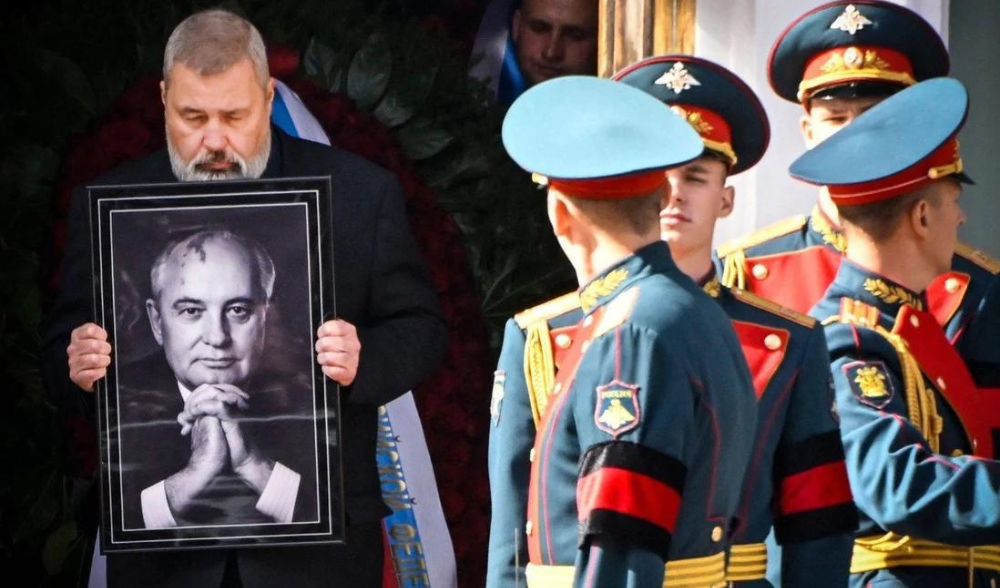This column originally appeared on September 7, 2022, in the South China Morning Post.
CLINICAL PROFESSOR TOM PLATE WRITES – Last week, the last president of the Soviet Union at 91 had to leave us (his wife Raisa had departed in 1999), so it must be said now that a true giant is gone. But to recall the pleasantry of having met and chatted with Mikhail Gorbachev and his wife Raisa, as I did in 1992 in Los Angeles, is to be able to believe anew, that Russia is anything but one maddening mangle of Vladimir Putins or Joseph Stalins.
So who was the more intelligent Gorbachev – Mikhail (sharp, boisterous) or Raisa Maximovna (queen-like, with laser-eyes)? Not sure but you sensed that with her near you, you wouldn’t have to be the smartest person in the room to seem the smartest person in the room.
Glamor-wise, they were easily the match of any First American Couple, though I was too young to have met the Kennedys John and Jackie when they royally ruled the global glamor stage in the 1960s.
Global political figures who rise to the top can come across as stiffs; some, after all, are born stiffs, and some are simply easily bored. Surely Mikhail, not to mention Raisa, was very easily bored; a long career inside the insidious and tedious Soviet political maze cannot have been one big bowl of cherry orchids.
But he had that ever-ready-to-banter bounce in the eyes, and in our chat, he responded with delight to the suggestion that as champion leader to end the dreary Soviet system and the Cold War, he might have been as popular a political figure in the U.S. as anyone (lowering the prospect of international nuclear war can do wonders for one’s image).
“Da!,” he said with emphatic merriment, when it was suggested, semi-jokingly, that if he’d run for office in California, he’d cop a landslide. Lady Raisa liked the fun idea as well.
But back in Russia, public opinion was then, as now, rather a different tale, and there are valuable lessons to be extracted from observations about his unpopularity at home. No doubt the nation’s plummet from prowess to chaos during his 1985-1991 run as top Communist coincided with widespread Russian decompression.
And among the Chinese governing elite (then and today) Gorbachev-ism is trotted out as a synonym for the allegedly inevitable political self-immolation that comes from prioritizing political reform prior to economic progress.
The once-immense powers of the former Soviet state were seen to shrink as if a drying sponge at the very time the West was soaking itself lavishly in the glories that followed the fall of the wall. Gorbachev’s perestroika, explicitly designed to pry open Russia politically, wound up inspiring China to go the other way, and more or less to keep it that way, to this day.
That change-agents will often get shortchanged goes with the tenuous territory. Quoted in a dispatch by Aljazeera, Pavel Palazhchenko, for decades Gorbachev’s interpreter, said of his former boss: “He liked to say that history is a fickle lady. I think that he believed and that he expected that the final verdict will be positive for him.”
The current king of the Kremlin, of course, is betting the full house of Russia against that; Putin failed to show even at the great Gorbachev’s funeral, confirmed spokesman Dmitry Peskov, “due to his work schedule.”
No doubt the invader of the Ukraine is quite busy these days with the execution of his horrible war. Imperiling, rather than contributing, to world peace. But Putin could not care less about winning a Nobel Peace Prize, as was awarded to Gorbachev in 1990, in what was perhaps the first draft of history’s judgment.
Leadership is practically a one-word cliché among quick-to-judge journalists and other commentators these days. More of it is deemed preferable to less. It’s thrown into critical discussions of political leaders as if it’s a magic formula for progress. (Fine – so by that measure Adolph Hitler was a better leader than Jimmy Carter?)
Though a Communist to the day he died last week, Gorbachev was trying to lead Russia out of Stalinist darkness; but Putin seems happier with the creepy old days of KGB and Siberia. His leadership may not be in question, but his choice of the war option is not what the world needs.
A comparison of the leadership style of John F. Kennedy in this context may seem bizarre. But the late Normal Mailer, one of America’s finest writers for many decades, offered a particularly prescient contribution in an outstanding collection of essay-length assessments of JFK published less than 10 years after the charismatic president’s assassination.
In the book J.F. Kennedy and Presidential Power (edited by Amherst College Professor Earl Latham), Mailer explains the Kennedy mystique with this insight: “The liberal Democrats’ … chronic disease is hero worship … [So he] would be the movie star come to life as President… The nation could no longer use a father; it was Kennedy’s genius to appreciate that we now required a leading man.”
What was true then is even truer now. In these times, it’s hard to be a leading social or political influencer without a positive flow of pictures — an Instagram, as it were, that stands out in the pixel jumble. War leaders get inherent dramatic framing, but history won’t be so easily dazzled.
Maybe even the Chinese elite will someday downgrade the Gorbachev lesson that still looms so huge in its mind. It would be globally uplifting to see Mr. Xi Jinping on an Instagram of peace. Men of Beijing: even Gorbachev had his good side.

Loyola Marymount Clinical Professor Tom Plate is the Phi Beta Kappa university’s Distinguished Scholar of Asian and Pacific Studies, Asia Media International founder and Pacific Century Institute vice president.

